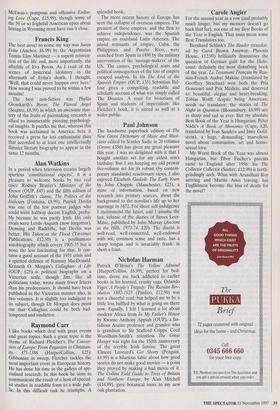Raymond Carr
I like books which deal with great events and great topics. Such a great topic is the theme of Richard Fletcher's The Conver- sion of Europe: From Paganism to Christian- ity, 371-1386 (HarperCollins, £25). Gibbonian in sweep, Fletcher tackles the most important event in European history. He has done his time in the galleys of spe- cialised research. In this book he aims to communicate the result of a host of special- ist studies in readable form to a wide pub- lic. In this difficult task he triumphs. A splendid book.
The more recent history of Europe has seen the collapse of overseas empires. The greatest of these empires, and the first to achieve independence, was the Spanish empire on mainland Latin America. The island remnants of empire, Cuba, the Philippines and Puerto Rico, were snatched from Spain in 1898 by the military intervention of the 'sausage-makers' of the US. The causes, psychological scars and political consequences of the loss of empire escaped analysis. In his The End of the Spanish Empire (OUP, £35) Sebastian Bal- four gives a compelling, readable and scholarly account of what was simply called The Disaster. A must for historians of Spain and students of imperialism; like Fletcher's book, it is aimed as well at a wider public.










































































 Previous page
Previous page